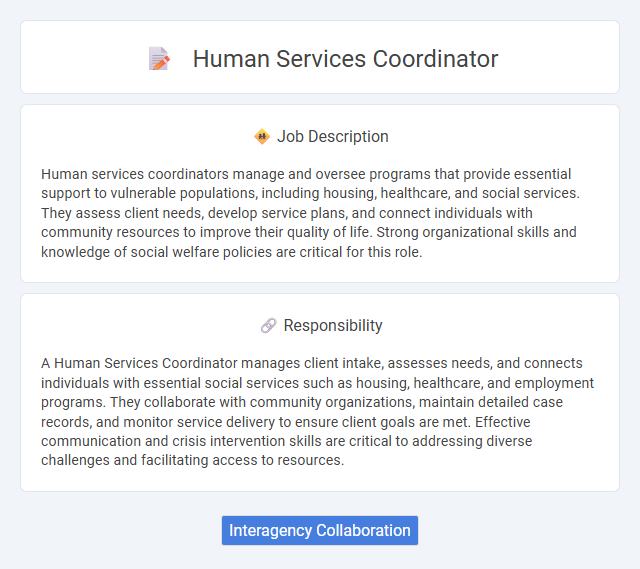
Human services coordinators manage and oversee programs that provide essential support to vulnerable populations, including housing, healthcare, and social services. They assess client needs, develop service plans, and connect individuals with community resources to improve their quality of life. Strong organizational skills and knowledge of social welfare policies are critical for this role.
Individuals who possess strong empathy and excellent communication skills are more likely to excel as human services coordinators, given the job's demand for understanding diverse client needs and coordinating resources effectively. Those who can manage stressful situations and remain patient while addressing complex social or mental health challenges may find this role suitable. Candidates lacking resilience or interpersonal skills might struggle to meet the job's emotional and organizational requirements.
Qualification
A Human Services Coordinator typically requires a bachelor's degree in social work, psychology, or a related field, with many roles preferring candidates holding a master's degree in human services or social administration. Essential qualifications include strong communication skills, case management experience, and proficiency in crisis intervention techniques. Certification such as Certified Case Manager (CCM) or Licensed Social Worker (LSW) enhances job prospects and demonstrates professional competency in coordinating community resources and client services.
Responsibility
A Human Services Coordinator manages client intake, assesses needs, and connects individuals with essential social services such as housing, healthcare, and employment programs. They collaborate with community organizations, maintain detailed case records, and monitor service delivery to ensure client goals are met. Effective communication and crisis intervention skills are critical to addressing diverse challenges and facilitating access to resources.
Benefit
Human services coordinator roles likely provide substantial benefits such as access to comprehensive health insurance, retirement plans, and paid leave. Employees may also experience professional growth opportunities through training programs and skill development. These benefits probably contribute to job satisfaction and long-term career stability in the human services field.
Challenge
Human services coordinators likely face the challenge of managing multiple client needs simultaneously while ensuring access to appropriate resources and support. Balancing limited funding and staffing constraints may complicate service delivery and response times. Effectively navigating bureaucratic hurdles could require strong problem-solving skills and adaptability.
Career Advancement
Human services coordinators manage client programs and connect individuals to essential resources, enhancing community well-being and social support systems. Career advancement opportunities often include roles such as program manager, social services director, or policy analyst, requiring experience in program development and leadership skills. Professional certifications like Certified Case Manager (CCM) and advanced degrees in social work or public administration significantly boost promotion potential.
Key Terms
Interagency Collaboration
Human services coordinators play a critical role in interagency collaboration by facilitating communication and resource sharing among healthcare providers, social service agencies, and government organizations. Their expertise in coordinating cross-sector efforts ensures comprehensive support for clients facing complex social, economic, and health challenges. By implementing streamlined referral systems and joint case management strategies, human services coordinators enhance service delivery and improve community outcomes.
 kuljobs.com
kuljobs.com